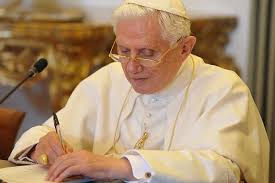(The holiness of the Church – and hence the salvation of the world – depends much upon the holiness of her priests. Hence, these words from Pope Benedict XVI from August 5th, 2009, on the Curé d’Ars ring as true and au courant today, and will unto the end of time). Editor.
BENEDICT XVI
GENERAL AUDIENCE
Papal Summer Residence, Castel Gandolfo
Wednesday, 5 August 2009
St. John Mary Vianney, the Holy Curé of Ars
Dear Brothers and Sisters,
In today’s Catechesis I would like briefly to review the life of the Holy Curé of Ars. I shall stress several features that can also serve as an example for priests in our day, different of course from the time in which he lived, yet marked in many ways by the same fundamental human and spiritual challenges. Precisely yesterday was the 150th anniversary of his birth in Heaven. Indeed it was at two o’clock in the morning on 4 August 1859 that St John Baptist Mary Vianney, having come to the end of his earthly life, went to meet the heavenly Father to inherit the Kingdom, prepared since the world’s creation for those who faithfully follow his teachings (cf. Mt 25: 34). What great festivities there must have been in Heaven at the entry of such a zealous pastor! What a welcome he must have been given by the multitude of sons and daughters reconciled with the Father through his work as parish priest and confessor! I wanted to use this anniversary as an inspiration to inaugurate the Year for Priests, whose theme, as is well known, is “Faithfulness of Christ, Faithfulness of Priests”. The credibility of witness depends on holiness and, once and for all, on the actual effectiveness of the mission of every priest.
John Mary Vianney was born into a peasant family in the small town of Dardilly on 8 May 1786. His family was poor in material possessions but rich in humanity and in faith. Baptized on the day of his birth, as was the good custom in those days, he spent so many years of his childhood and adolescence working in the fields and tending the flocks that at the age of 17 he was still illiterate.
Nonetheless he knew by heart the prayers his devout mother had taught him and was nourished by the sense of religion in the atmosphere he breathed at home. His biographers say that since his earthly youth he sought to conform himself to God’s will, even in the humblest offices. He pondered on his desire to become a priest but it was far from easy for him to achieve it. Indeed, he arrived at priestly ordination only after many ordeals and misunderstandings, with the help of far-sighted priests who did not stop at considering his human limitations but looked beyond them and glimpsed the horizon of holiness that shone out in that truly unusual young man. So it was that on 23 June 1815 he was ordained a deacon and on the following 13 August, he was ordained a priest. At last, at the age of 29, after numerous uncertainties, quite a few failures and many tears, he was able to walk up to the Lord’s altar and make the dream of his life come true.
The Holy Curé of Ars always expressed the highest esteem for the gift he had received. He would say: “Oh! How great is the Priesthood! It can be properly understood only in Heaven… if one were to understand it on this earth one would die, not of fright but of love!” (Abbé Monnin, Esprit du Curé d’Ars, p. 113). Moreover, as a little boy he had confided to his mother: “If I were to become a priest, I would like to win many souls” (Abbé Monnin, Procès de l’ordinaire, p. 1064). And so he did. Indeed, in his pastoral service, as simple as it was extraordinarily fertile, this unknown parish priest of a forgotten village in the south of France was so successful in identifying with his ministry that he became, even in a visibly and universally recognizable manner, an alter Christus, an image of the Good Shepherd who, unlike the hired hand, lays down his life for his sheep (cf. Jn 10: 11). After the example of the Good Shepherd, he gave his life in the decades of his priestly service. His existence was a living catechesis that acquired a very special effectiveness when people saw him celebrating Mass, pausing before the tabernacle in adoration or spending hour after hour in the confessional.
(To continue reading, please see here).


